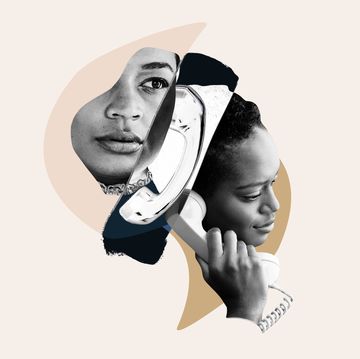Shanika Ranasinghe was five years-old when she first heard a voice.
'Make your sister stand up in the trolley,' it demanded, the sound filling her mind. At the time, Shanika was shopping with her family in the local supermarket; her sister was sitting in the backseat of a shopping trolley.
Even as a youngster, she knew that to do so would cause her younger sister harm, so she replied: 'If she does that, she'll fall,' to which the voice said, 'That's the point.'
From this moment on, Shanika regularly heard voices. Now 28, the voices sound as though a part of her is speaking from inside her head (experiences of voices vary), commenting on her daily life. They talk to her about what she's doing, and often make her days 'so much' better.
Shanika didn't tell anyone about the voices until she started studying Music at Oxford University, not because she was ashamed, but because she considered it normal. She told ELLE UK, 'I just thought everyone's brain worked like that.'
A happy childhood
It might surprise you to learn that voice hearing is fairly common. Charity Mind estimates that between 5 and 28 per cent of the adult population hear voices. Thinking about it in some context, 10 per cent of the world's population is left-handed, which is a similar statistic. So there are just about as many left handed people as there are voice-hearers.
While reasons for voice hearing (or auditory hallucinations, as they are also called) are varied and some unknown, an increasing number of studies have pointed towards 'significant trauma' as a trigger for auditory hallucinations.
Rachel Boyd, Information Manager at Mind, explains: 'There are lots of explanations for why someone might hear voices. It can happen when you're falling asleep or waking up if your brain is still in a dreamlike state. Lack of sleep, bereavement, and physical illness are other common reasons why some people might hear voices. It can also be associated with the experience of abuse or trauma, or can be part of a mental health problem like psychosis or schizophrenia.'
For Shanika, there was no exact trigger. Her voices have always, on the whole, been extremely positive. Some are nurturing presences that reassure her she is safe and loved, while others tell her she is a good person. The voices sound like herself, clearly from inside her head, which means she never mistakes them for another person.
'Sometimes I'll be doing something mundane like shopping and then the voices will start off quite loudly about something completely unrelated, so it does come as a surprise,' she explains. 'Or they'll disappear for a few weeks and I'll adjust to life without them, and then they come back with with no warning whatsoever.'
Yet something changed during her second year of University. Voices that had once oscillated between benign, positive and rarely negative became more and more aggressive. Bullying, an unsupportive tutor and the competitive nature of Oxford University led her to feel as though she wasn't 'keeping up.'
'I felt that I was the runt of the litter,' says Shanika.
These feelings were compounded by the ending of a significant romantic relationship. The voices started to talk increasingly about death and, eventually, about suicide. They told her they wanted her dead and began discussing ways she could kill herself, so much so she became 'very withdrawn and dysfunctional.'
Though never an extroverted personality, Shanika had always been happy and she'd found a close group of friends at university. But this quickly changed. Now she sat indoors and failed to attend any classes. For the first time, aged 21, her voices became truly distressing.
The changing voices
This shift in Shanika's experience is not uncommon. 'Every person's experience of hearing voices is unique to them,' explains Boyd. 'Often voices are a problem because of your relationship with them rather than just because you hear them. At some points people may find their voices to be friendly and a positive experience, while at other times they may be frightening and one might want them to stop.'
In the Christmas holidays of her third year, Shanika was referred to a psychiatrist in Oxford via her GP. After a 90-minute consultation, he couldn't find anything 'wrong' with her.
She was left with no diagnosis or support, free to continue her downwards spiral. Though not going to classes, she kept on studying, doing what she could to keep some semblance of control over her worsening situation.
With no alternative, Shanika carried on – her introversion continued – and months later she attempted suicide during her final exams.
Thankfully, her attempt failed and – a testament to her willpower – she managed to finish university with a 2:2. After graduating, and living at home again, it was impossible to hide from her parents. 'I told them everything,' she explains. 'I'm from Sri Lanka and in South Asian cultures people don't talk about mental health. There's not much of an understanding in our culture.'
Though understandably upset, her family were extremely supportive. In fact, she says her family are the reason she's been able to 'keep going.'
A different GP sent her to another psychiatrist who spent a year and-a-half 'trying to see what was going on.' Shanika was immediately sent to therapy, firstly CBT (cognitive behavioural therapy), which she didn't find particularly effective, and then Schema Therapy, which she says, 'transformed my relationship with the voices and my ability to function and do things.'
Schema therapy combines the use of CBT with experiential, interpersonal and psychoanalytic therapies to look at the root of behavioural patterns. Shanika explains it as, 'a lot of looking at the past, and where different life ideas and beliefs about yourself come from. Once you've identified what those beliefs are and where they come from, then you apply them to the present day and you say, 'well this is my past and this is why I feel this way, and I can't change the past, but this is what I can do in the present.''
This helps her manage her voices, and more than that, be compassionate towards them.
She now speaks to her voices, asking, 'why are you saying this?', 'why are you feeling this?' and, 'how can I help you with how you're feeling right now?'
She explains to us, 'often my voices are a manifestation of something that's going on inwardly. So it can be a way to communicate with myself about something that I'm suppressing.'
Mindfulness has also been a particularly useful tool for Shanika, specifically colouring books, since they help her be as 'in the moment' as possible.
Fourteen years since the supermarket incident, Shanika has finally found a lifestyle that suits her. She started working at Voice Collective, using her own experience to contribute and help deliver a more positive message about auditory hallucinations. There is often a huge stigma attached to voice-hearers. They're depicted as 'crazy' and, as one doctor described Shanika, 'troubled. She wasn't 'troubled', she just needed help.
People also often mistakenly link voice hearing and mental health issues that require medical attention. Though voice-hearing is medically seen a symptom of psychosis or schizophrenia, Hearing Voices states: 'research suggests that the majority of people who hear voices have no mental health issue at all.'
And, importantly, the diagnosis isn't necessarily for life. Stress or difficulty surrounding unmanaged voice hearing can lead to a diagnosis of depression and anxiety, but once the auditory hallucinations are better managed, these other issues can lessen or disappear. Hearing Voices explains, 'Many people who are part of our network have met the criteria for a diagnosis at some point in their lives – but no longer do.'
In fact, Shanika told us that if she had a choice she, 'would not get rid of [her] voices.'
'I think what I've been through has made me the person that I am today,' she explains. 'I'm now able to help other people. Things aren't always completely rosy, but I can live alongside my voices.'
If This Story Has Affected You
Although there is no quick and simple treatment for auditory hallucinations, there is a range of things that can help manage them. We asked Rachel Boyd, Information Manager at Mind, what you should do if you've experienced (or are experiencing) voices you're uncomfortable with or distressed by.
If you feel like your voices are affecting your quality of life or if you feel threatened and unable to control them, talk to your GP. They may refer you to a psychiatrist who may give you a diagnosis and suggest treatments.
If the voices are particularly troubling, you may be prescribed medication. While not a cure, anti-psychotic drugs can help control the voices and stop the distress caused by them.
Self-management techniques, such as regular physical exercise, meditation and spending time with supportive friends and family are also important when living with voices.
Some people find keeping a diary helps them feel more in control and helps to recognise when their voices are causing problems.
Talking to other people who hear voices can help people to talk about their experiences in a safe, non-judgmental environment and feel less alone. Peer support groups such as the Hearing Voices Network, or the online community Elefriends can help people to feel heard and understood
Daisy Murray is the Digital Fashion Editor at ELLE UK, spotlighting emerging designers, sustainable shopping, and celebrity style. Since joining in 2016 as an editorial intern, Daisy has run the gamut of fashion journalism - interviewing Molly Goddard backstage at London Fashion Week, investigating the power of androgynous dressing and celebrating the joys of vintage shopping.
















